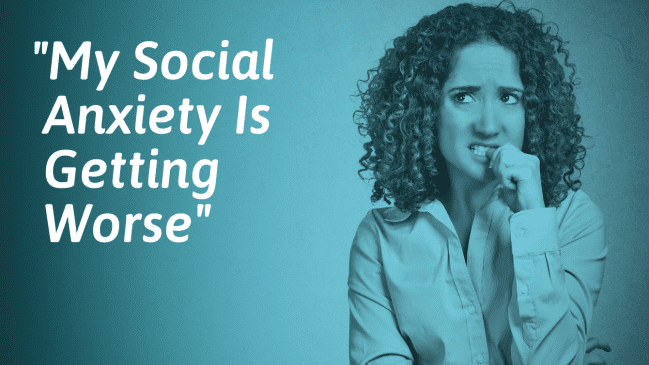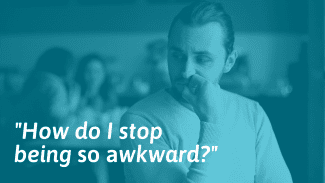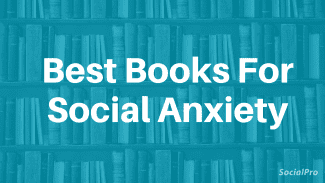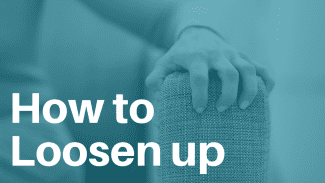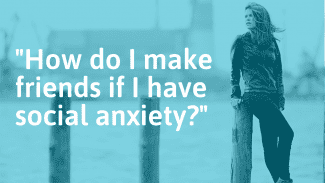“My social anxiety is getting worse. I used to be able to talk to people, but since finishing school, I have found myself stuck in loneliness and isolation. At work, I just do what I need to do and go home. As I get older, it just seems to get worse. I panic even with small interactions. What can I do?”
Many young adults feel that as the years go by, social interactions seem to get more complicated. Anxiety can cause a self-defeating cycle in which you isolate yourself. You don’t go out because you don’t have any friends, but you don’t make any friends because you don’t go out.
As time goes on, it may feel impossible to make new friends. Negative scenarios spiral in your mind. What will you say if they ask what you did over the weekend and you have to admit you did nothing?
Some people find that they develop physical symptoms like sweating in social situations as they get older or start having panic attacks. Others say that their social anxiety spills over to more situations and becomes more extreme. For example, their online life was an escape from loneliness in school, but as the years went by, they found themselves feeling anxious even about posting comments online.
If you identify with these situations of social anxiety getting worse over the years, this guide is for you.
Sections
What to do if your social anxiety is getting worse
1. Keep challenging yourself
It’s essential to keep working on your “social muscles.” Note that you shouldn’t ignore your social anxiety. Think of it like a physical injury. If someone who is out-of-shape and has knee problems wants to improve their physical health, it wouldn’t be wise for them to start running marathons all at once. They would find it too difficult and feel defeated. Besides, they’d hurt their knee even more. Your social anxiety is like that knee injury.
If you’re finding it challenging to talk to people, don’t push yourself to start going out to parties and talk to groups all at once. Instead, start small and slowly build up as your comfort level grows.
2. Exercise
It might seem like there’s no connection between exercise and social anxiety. But making sure you exercise can help your social anxiety in several ways. First, by making you more confident and comfortable in your body. As you get fitter, you gain a sense of accomplishment that can translate into how you interact with others.
Getting enough exercise can also help your body regulate your nervous system and release anxiety fighting chemicals like endorphins.
3. Find some positive outlets for your emotions
Our feelings are messengers that are trying to tell us something. We usually try to avoid anger, fear, and sadness because they feel “negative,” but these emotions want to be felt like all others. Try finding positive outlets to process your emotions. They can be verbal outlets, like support groups, talk therapy, and journaling. Non-verbal outlets like dance, drawing, and collaging can also be useful.
4. Stop using alcohol or drugs as a crutch
Drugs and cigarettes can calm us down in the moment. We can use other things in this way, like video games, shopping, and food. This type of self-medication brings us temporary happiness and relief. But afterward, we end up feeling anxious again – and often, even worse than we did before.
Self-medication can also subconsciously teach us harmful lessons about ourselves. For example, if we have a drink before every interaction with other people, we might end up believing that we’re not able to interact without alcohol.
5. Try Cognitive Behavioral Therapy
CBT can help you recognize and combat some of your negative thinking patterns directly. For example, you might work on noticing what thoughts come up when you think about public speaking. It might be something like, “I always mess things up.” A CBT therapist will help you consider which of your thoughts aren’t so realistic and reframe them to be more productive.
One study found that CBT’s effects on socially anxious people weren’t just a self-reported improvement in their feelings. Blood samples showed change at a cellular level[1] after only nine weeks of therapy.
We recommend BetterHelp for online therapy, since they offer unlimited messaging and a weekly session, and are cheaper than going to a therapist's office.
Their plans start at $64 per week. If you use this link, you get 20% off your first month at BetterHelp + a $50 coupon valid for any SocialSelf course: Click here to learn more about BetterHelp.
(To receive your $50 SocialSelf coupon, sign up with our link. Then, email BetterHelp’s order confirmation to us to receive your personal code. You can use this code for any of our courses.)
6. Practice mindfulness
Mindfulness means developing an awareness of the present moment – including our thoughts, feelings, and sensations – in a non-judgemental way. Mindfulness can be an affordable and accessible alternative for CBT and other cognitive therapies.[2]
You can also practice both mindfulness and CBT simultaneously – they can complement each other quite well. Mindfulness can help you recognize what triggers your anxiety, the thoughts that come up, and how to deal with the sensations without letting them overwhelm you.
There are many ways to start practicing mindfulness, including signing up for an eight-week Mindfulness-Based Stress Reduction course to gain some structure. You can also try free Youtube videos or apps, like Calm, Insight Timer, or Waking Up With Sam Harris. Sam Harris offers his complete app for free to anyone who asks, so don’t let price be a barrier. You can also practice mindfulness through mindful movement practices like tai chi, qi gong, or gentler forms of yoga.
7. Learn grounding techniques
If anxiety has become a regular visitor in your life, it can help to learn ways to calm yourself down in the moment. As stressful and anxiety-inducing situations come up, practice paying attention to your breath and your surroundings. Experiment with different techniques, like 4-7-8 breathing, to find the one that works best for you.
8. Cut out toxic people
When you don’t have many social interactions, you may hesitate to cut anyone out of your life. But if you have someone in your life who makes you feel bad about yourself by judging you or putting you down, they might be causing your social anxiety to worsen. That means that it will be less likely for you to feel comfortable making new, more enriching connections.
9. Try giving up caffeine
While caffeine use is so normalized that most people don’t consider it a problem, it can increase anxiety without us even noticing. You might experience some “withdrawal” symptoms at first. Still, many people report a significant benefit to their anxiety levels after giving up coffee and other forms of caffeine like soda and chocolate. Instead, try drinking herbal tea, which can help reduce anxiety.[3]
10. Cut back on social media use
Increased social media use has been linked to anxiety.[4] When we log on to social media, we’re treated to snapshots of the best moments of someone’s life. We see pictures of people laughing with their friends, standing by amazing views and having adventures, wedding photos and baby announcements. Scrolling through our feed, it’s easy to believe that these people are all out there leading amazing lives, while nothing of importance is happening to us. Even if we logically know people are only sharing their best and brightest moments, we feel differently as we scroll through our accounts.
Try limiting your use of social media, or perhaps unfollow accounts that make you feel bad about yourself. Instead, consider following more positive accounts.
Reasons why your social anxiety may have gotten worse
1. You’ve isolated yourself for a long time.
Social interaction is like any skill: we have to practice it to get really good at it. The more we isolate ourselves from others, the more intimidating it will seem to change. As we isolate, our comfort zone – the “area” of things we’re comfortable with – gets smaller.
Sometimes, we need to take space for ourselves to regulate our nervous system and relax. It’s normal to need some time alone. But if we avoid everything that makes us feel uncomfortable, paradoxically, the number of things that make us feel uncomfortable can grow and grow.
Related: See our guide on how to stop feeling uncomfortable around people.
2. Your physical health has gotten worse
Physical health and mental health are closely intertwined. Your mental health can indeed cause physical problems, but the reverse is also true.[5] Several vitamin and mineral deficiencies can cause depression or symptoms that look like anxiety and depression, like fatigue.[6]
Exercise can act as a natural antidepressant and stress-buster. Being overweight, having high blood pressure, and other health concerns can also negatively impact your mental health and how you react to stressful situations.
3. You had a social event go badly
A negative social experience can stay with us for a long time.
As humans, we’re naturally geared towards remembering bad experiences more vividly than positive experiences. That’s not our fault – we process negative and positive experiences in different parts of our brain.[7]
That means that it doesn’t matter if you had five times when you said hello to someone and they smiled and said hello back. If someone frowned when you said hi just once, you’re likely to ruminate over it.
This effect is even more significant if you tend to ruminate, as people with depression and anxiety do.[8]
Common questions
How do you know if you have social anxiety?
Social anxiety can manifest differently in people. Common symptoms are: avoiding certain types of social situations, constant worry about doing something wrong in front of others, and fear of being criticized. Physical symptoms like increased heartbeat or nausea are also common.
Why do we feel anxious around people?
Think of anxiety as a flight-or-fight response. When we recognize a threat, our body goes into what is known as the fight, flight, freeze, or fawn response. This response prepares our body to react to the danger. Imagine an animal that is “playing dead” in an attempt to get a predator to become uninterested. The animal is entirely still, but inside, stress hormones are rushing through their body. They are on hyperalert, waiting for the moment the predator walks away so that they can flee.
With social anxiety, our body has learned that being around other people isn’t safe. Someone might have friendly intentions, but our body is preparing us for running away or freezing. This response might have been learned unconsciously through bullying or growing up with unsupportive families.
Sometimes, there doesn’t seem to be an exact cause. A dysregulated nervous system will react more intensely to threatening situations. Diet, exercise, and overall health all play significant roles in how regulated our nervous systems are.
Social anxiety is quite common, precisely because humans are such social animals. It may sound contradictory but think of it this way. It’s really important to us what other people think about us. As many times as you’ll hear, “just don’t care about what others say,” we’re not wired that way. If we have reason to believe that social interactions won’t go well, it’s natural to feel anxious about it.
Related: How to stop feeling nervous around people.
Why did I suddenly get social anxiety?
Sudden social anxiety can develop after a negative or traumatic social experience. It’s also common for social anxiety to develop once someone has become isolated. After going through an extended period without talking to anyone, it can seem like an impossible task.
Look at it like exercise: when you practice consistently, you get stronger. But after a long time with no training, your body gets weaker.
Does social anxiety go away?
Some people find that they “grow out” of social anxiety. However, others report no change or even find that their social anxiety has gotten worse with age. Often, social anxiety doesn’t go away by itself. There are many types of treatments that can help social anxiety.
